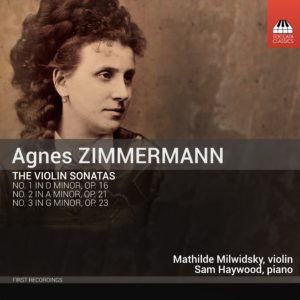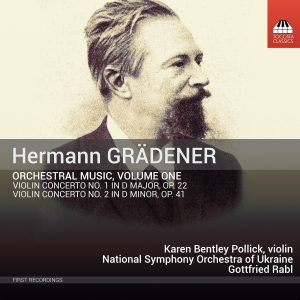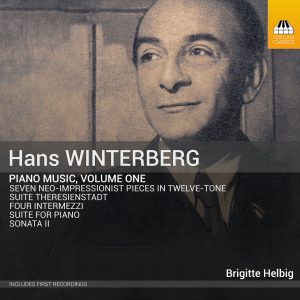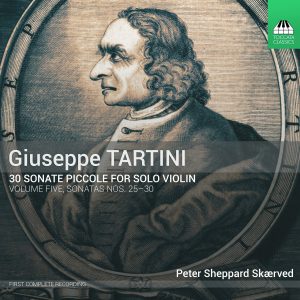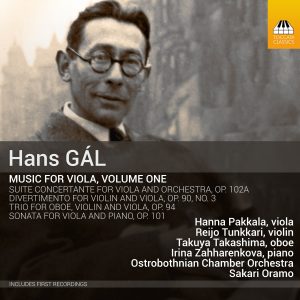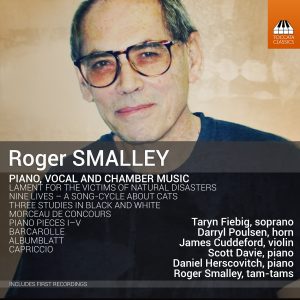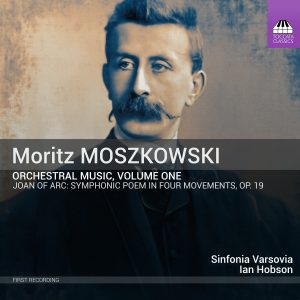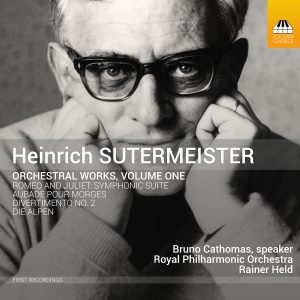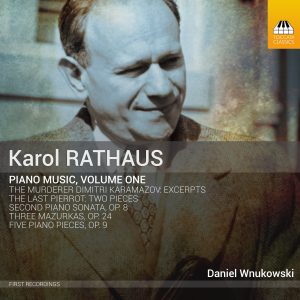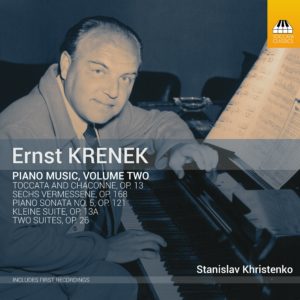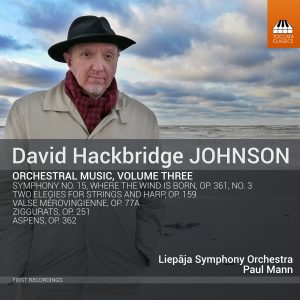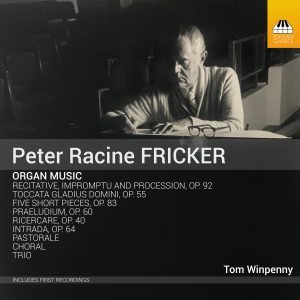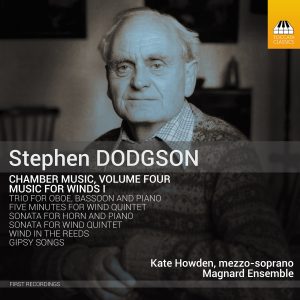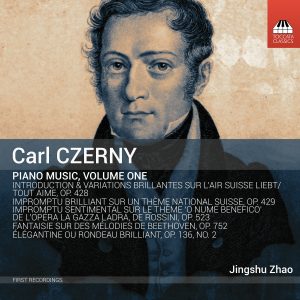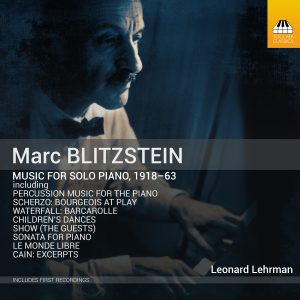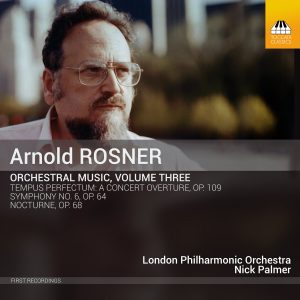Search Results for "Space Wolf: The First Omnibus mp3 torrent" – Page 31
Agnes Zimmermann: The Violin Sonatas
Born in Cologne, Agnes Zimmermann (1847–1925) settled in London as a child. She made her concert debut in 1863, playing the ‘Emperor’ Concerto, and was soon celebrated as one of Europe’s more important pianists, her partners in chamber music including Clara Schumann, Joseph Joachim, Alfredo Piatti and Wilma Neruda, Lady Hallé. She enjoyed a reputation also as teacher, music editor and composer. At the centre of her modest output of compositions are three substantial violin sonatas. Dramatic and lyrical by turn, and always beautifully crafted, they lie somewhere between Mendelssohn and Brahms, but demonstrate an impressively personal musical voice.
Mathilde Milwidsky, violin
Sam Haywood, piano
FIRST RECORDINGS
Hermann GRÄDENER: Orchestral Music, Volume One
The German-born, Vienna-based Hermann Grädener (1844–1929) is yet another composer whose music, esteemed in its own time, has since slipped between the floorboards of history. Yet this first recording of his two violin concertos – substantial works both, downstream from Brahms, and with a hint of Sibelius – prove him to have been one of the more important Romantics, with a strong sense of drama, a sure hand for musical architecture and a natural flair for extended melody.
Karen Bentley Pollick, violin
National Symphony Orchestra of Ukraine
Gottfried Rabl, conductor
Hans WINTERBERG: Piano Music, Volume One
The tale of Hans Winterberg (1901–91) is a strange one. A survivor of the Terezín concentration camp, where he had been interned as a Czech Jew, he settled in Munich after the Second World War as a German citizen, and his music enjoyed a number of broadcasts – but with his death his estate disappeared into a legal limbo, emerging only in 2015. This first album of his piano music reveals an unusual and individual voice, an idiosyncratic blend of Janáček, Ravel, Schoenberg and other mid-twentieth-century masters, animated by a hard-edged, freewheeling energy and grim humour reminiscent of his close contemporary, Nikos Skalkottas.
Brigitte Helbig, piano
Giuseppe TARTINI: Sonate piccole, Volume Five: Nos. 25–30
In the last years of his life, the composer, violinist and swordsman Giuseppe Tartini (1692–1770) laboured at a vast cycle of sonatas for solo violin. The resulting manuscript offers the most important composition for solo violin after Bach and, at six hours in duration, the largest integrated work for the instrument. This first complete recording is based on a fresh study of the source and includes a number of works deciphered from Tartini’s shorthand and overlooked in earlier editions. These ‘Little Sonatas’ tread a delicate line between Baroque formality and proto-Romantic passion, occasionally illuminated with an echo of the folk-fiddling of his Slovenian homeland.
Peter Sheppard Skærved, violin
Hans GÁL: Music for Viola, Volume One
Hans Gál (1890–1987) wrote extensively for the viola, including several remarkable works dating from the first decade of his new life in Edinburgh, where he took refuge after the Nazis seized power in his native Austria. His poignant Suite Concertante for viola and orchestra – effectively a concerto for the instrument – is joined here by three substantial chamber works, all infused with Gál’s trademark lyricism.
Hanna Pakkala, viola
Reijo Tunkkari, violin (Tracks 5-8, 12-15)
Irina Zahharenkova, piano (Tracks 9–11)
Takuya Takashima, oboe (Tracks 12–15)
Ostrobothnian Chamber Orchestra (Tracks 1–4)
Sakari Oramo, conductor (Tracks 1–4)
Roger SMALLEY: Piano, Vocal and Chamber Music
Roger Smalley (1943–2015) made his mark, first in his native Britain and then in Australia, as composer, pianist, conductor, writer, academic and teacher. Although as performer and commentator he was at the forefront of musical modernism, he was also very fond of nineteenth-century Romanticism, and much of his music bridges the gap between old and new, retaining its roots in the past while reflecting the concerns of his own time, as the works on this album demonstrate.
Taryn Fiebig, soprano (Tracks 2–10)
Darryl Poulsen, horn (Tracks 22)
James Cuddeford, violin (Tracks 11)
Daniel Herscovitch, piano (Track 1)
Scott Davie, piano (Tracks 2–10)
Roger Smalley, tam-tams (Track 22)
Moritz MOSZKOWSKI: Orchestral Music, Volume One
The Polish composer Moritz Moszkowski (1854–1925) is best remembered for a handful of virtuoso piano pieces, but he also produced a substantial body of orchestral music, most of it unperformed for decades. Astonishingly, he was only in his early twenties when he wrote his monumental ‘Symphonic Poem in Four Movements’ Johanna d’Arc – heard here in its first recording – a vast symphonic fresco depicting the life, death and transfiguration of the heroine of Friedrich Schiller’s 1801 play, Die Jungfrau von Orleans. Moszkowski admitted to the influence of Wagner and Raff on the work – but he also managed to prefigure the musical language of the Hollywood epics of sixty years later.
Sinfonia Varsovia
Jakub Haufa, solo violin (Tracks 1, 4)
Ian Hobson, conductor
A Diaposon découverte
Heinrich Sutermeister: Orchestral Works, Volume One
Heinrich Sutermeister (1910–95) belongs to the generation of Swiss composers after Bloch, Honegger, Martin and Schoeck. His operatic version of Romeo and Juliet soon spread his reputation far afield, and conductors as prominent as Böhm, Karajan and Sawallisch championed his works. Although his star has waned in the quarter-century since his death, the four orchestral works recorded here – ranging from the dramatic essay he drew from that first Shakespearean operatic success, via the easy-going charm of two lighter suites, to his deeply felt response to the Swiss landscape – bring a salutary reminder of why his music appeals so directly to its audiences.
Mit Deutschem Kommentar
Bruno Cathomas, speaker (8–13)
Royal Philharmonic Orchestra
Duncan Riddell, leader
Rainer Held, conductor
Karol Rathaus: Piano Music, Volume One
Karol Rathaus (1895–1954), born on the eastern fringes of the Austro-Hungarian Empire, was one of the myriad Jewish composers who had to abandon a successful career in Europe, where he wrote for stage, screen and concert hall, and flee to the USA; there he earned his living in academia, working in obscurity. This first recording of his piano music reveals a powerful and individual voice, where echoes of his distant homeland colour a musical language that is striking for its harmonic tension and rhythmic energy.
Daniel Wnukowski, piano
Ernst KRENEK: Piano Music, Volume Two
This first extended survey of the piano music of Ernst Krenek (1900–91) continues with a range of works showing his craftsmanship and imagination – and humour. The early Toccata and Chaconne, Op. 13, has its origins in a joke intended to pull the legs of musicologists and music critics, but it develops into a massive contrapuntal essay of astonishing ambit. Krenek’s treatment of Baroque and contemporary dances in the three early suites reveal a fondness for learned whimsy – and that wry dispassion informs even the elegiac and brittle Fifth Sonata, written a quarter-century later in American exile. The closing Sechs Vermessene are kaleidoscopic miniatures with an improvised quality, as if advanced musical modernism were meeting the freest of free jazz.
Stanislav Khristenko, piano
David Hackbridge JOHNSON: Orchestral Music, Volume Three
The first two Toccata Classics volumes of the orchestral music of the English composer David Hackbridge Johnson presented three mighty symphonies, conceived on a large scale and powerful in their utterance. The Fifteenth Symphony, tone-poems and other works offered here show a change in focus: an engagement with the natural world, reflecting the poetry of changing light and shifting winds, with man’s impermanent presence dwarfed by the implacable grandeur of nature. Here Paul Mann, a frequent Toccata Classics artist, conducts the orchestra of the very town- Liepaja, on the coast of Latvia- that inspired the Fifteenth Symphony.
Liepāja Symphony Orchestra
Kārlis Catlaks, E flat clarinet (Track 2)
Kristaps Catlaks, bass clarinet (Track 2)
Ilze Zariņa, leader
Paul Mann, conductor
Peter Racine FRICKER: Organ Music
The London-born Peter Racine Fricker was once a prominent figure on the British musical landscape but slipped from view after he took up a teaching post in California in 1964. This first-ever survey of his organ music reveals a vigorously contrapuntal style, one which reconciles a taste for crunchy dissonance with a strong sense of melodic direction, its moods ranging from angular elegance to fierce climaxes swirling with energy and glittering with light. The organist here is Tom Winpenny, Assistant Master of the Music at St. Albans Cathedral and one of Britain’s brightest young stars in the organ firmament. He was formerly Sub-Organist at St. Paul’s Cathedral, and during this time he performed with the Cathedral Choir at the American Guild of Organists National Convention, performed in Mahler’s Symphony No. 8 with Valery Gergiev and the London Symphony Orchestra, and played for many major state occasions. He has also broadcast regularly on BBC Radio and been featured on American Public Media’s ‘Pipedreams.’
Tom Winpenny
Organ of Bridlington Priory
Stephen DODGSON: Chamber Music, Volume Four: Music for Winds I
This fourth album in the Toccata Classics survey of the chamber music of London- born Stephen Dodgson (1924–2013) offers a first instalment of his many works for woodwinds. Much of it brings Dodgson’s sense of fun to the fore, often through rhythmic mischief or an insouciance that recalls Poulenc, but it also has that particularly English strain of lyricism that suggests the impermanence of beauty.
Kate Howden, mezzo-soprano (Tracks 4–7)
Magnard Ensemble (Tracks 1–3, 17–21)
Suzannah Clements, flute (Tracks 1–3)
Mana Shibata, oboe (Tracks 8–10, 14–16)
Joseph Shiner, clarinet (Tracks 4–10)
Catriona McDermid, bassoon (Tracks 8–10, 14–16)
Jonathan Farey, horn (Tracks 11–13)
Suling King, piano (Tracks 4–7, 11–16)
Carl CZERNY: Piano Music, Volume One
The Viennese-born Carl Czerny (1791–1857) is best remembered for his countless pedagogical studies, hundreds and hundreds of them. But Czerny’s astonishing fecundity – his opus numbers go up to 861, but there is much more music than that – has served to obscure the fact that he was an important composer in his own right, his works forming a link between Beethoven (his teacher) and Liszt (his student), between the Classical and Romantic eras. The pieces recorded here, all for the first time, reflect the brilliance of his own playing and were intended to impress the salons of Biedermeyer Vienna.
Jingshu Zhao, piano
Marc Blitzstein: Piano Music, 1918–63
The American composer Marc Blitzstein (1905–64) is best known for his left-leaning stage works; indeed, his pro-union musical The Cradle Will Rock achieved some notoriety in 1937 when the authorities shut it down. But Blitzstein was also a fine pianist and wrote for the instrument all through his career. This first album ever to be devoted entirely to his piano output offers a conspectus of 45 years of Blitzstein’s music, from lyrical juvenilia via spiky protest pieces and jazzy dance numbers to intimate ‘family’ pieces for close friends.
Leonard Lehrman, piano; speaker
Helene Williams, speaker
Arnold Rosner: Orchestral Music, Volume Three
The musical language of the New York-based Arnold Rosner (1945–2013) had its roots in the modal harmony and rhythm of pre-Baroque polyphony and evolved in an array of unusual directions, producing a style that is instantly recognisable and immediately appealing – as can be heard in the three works on this recording. Rosner’s Nocturne suggests the immensity – and the implacable violence – of outer space, whereas his overture Tempus Perfectum has its starting point in Renaissance dance. The monumental Sixth Symphony opens with music of volcanic ferocity and vehemence; the central Adagio then provides an island of troubled calm before the dignified opening of the finale presages a symphonic Allegro of wild, freewheeling energy; only when its immense force is spent does this powerful masterpiece sink to an uneasy close.
London Philharmonic Orchestra
Nick Palmer
Stay In the Know
JOIN THE TOCCATA NEWSLETTER
"*" indicates required fields
By visiting our site, you agree to our privacy policy regarding cookies, tracking statistics, etc.
